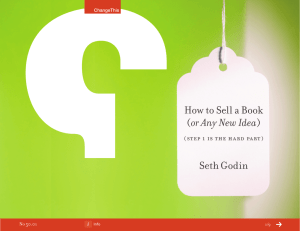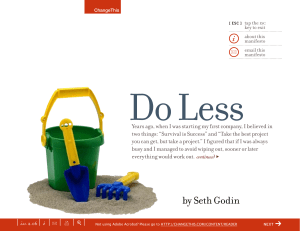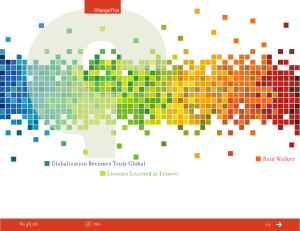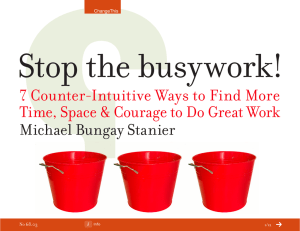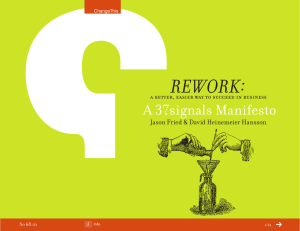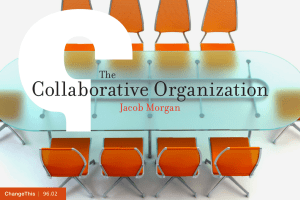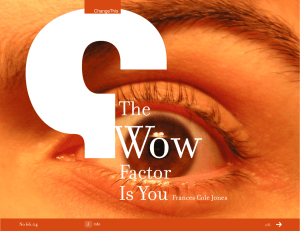Death Blues 100 the celebration and opportunity of each moment
advertisement
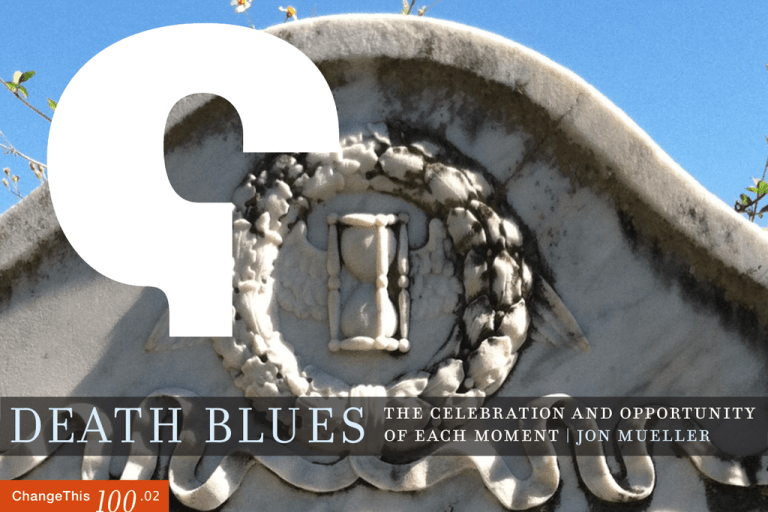
Death Blues ChangeThis 100 .02 the celebration and opportunity of each moment | jon mueller On August 7, 2011, the San Diego news was filled with the story of a local police officer named Jeremy Henwood. While he waited in line at a fast food restaurant, a young boy approached him at the counter and asked him for ten cents so he could buy some cookies. Instead of asking him where his parents were, or giving him a lecture on asking people for money, Officer Henwood offered to buy the cookies and started up a conversation with him. He asked him what he wanted to be when he grew up, and the child replied that he wanted to be an NBA star. Officer Henwood told him that, while it would be very difficult to become a professional athlete, if he worked really hard he could do it. The child understood the challenges, but the officer’s belief in him gave him some added hope and inspiration. They chatted for a bit about his favorite teams and players, and then Officer Henwood said goodbye. This child was later interviewed by the media about the interaction, because as Officer Henwood drove away from the restaurant, someone pulled alongside his squad car, aimed a shotgun at him, and killed him. It was a totally random and senseless act. ChangeThis 100 .02 The young boy, stunned, recalled the positive conversation he had with the officer, a conversation that will undoubtedly affect him for the rest of his life. A simple act of kindness from a stranger gave him incentive to work as hard as he could to achieve his dream before it all comes to an end. How much time is left? Do we know? Does our plan take into account this simple, unavoidable question? What happens when we thoroughly hold the understanding that our lives are finite? How does this understanding of our end shape our present? And how do we become more present in each moment? Because each moment holds an opportunity and a decision to do so. We all have dreams for the future: Making a million dollars, getting a new car, finishing school, getting a promotion, achieving any number of goals that while potentially important, might not be possible in this instant. But considering an overdue apology, sending a positive email to someone, calling a family member, talking to a co-worker about a project idea, connecting in any way with someone in order to make something good happen can be done right now. And consider the affect those immediate actions might have on the longer-term goals listed above. Many big events in our lives are the results of a series of immediate but important smaller events that take place before them. Immediate positive actions are the structural building blocks for what’s to come. ChangeThis 100 .02 Death Blues The inevitability of death is a blessing and a curse, a complicated puzzle we each have our own approach to, as seen in both religious and secular ideologies. It can be incredibly difficult to understand the phenomenon, let alone to describe it. That type of complexity is something historically addressed in Blues music. It functions as a way to deal with something difficult and complicated in a celebratory way—through the joy of music. It is a way to transform the tragedy and sadness into a celebration of life. Sometimes words or actions alone can’t quite express the complexity of human emotions; they can’t define the breadth of characteristics that a situation can make us feel. But, often, music can. It happens through the combination of sound, words, and movement to create a feeling within us, and while there might be a direction implied with the combination of those elements, each of us essentially has our own interaction with it. Through that, people might find better ways to deal with an issue. That realization can become a release, a momentary erasing of an issue too difficult to address by normal means. We know our time is finite, yet rather than give in to hopelessness, we celebrate and pursue happiness through our relationships, through our ideas, and through our actions. We sing the Death Blues. ChangeThis 100 .02 It’s a way to deal with the situation, and to be conscious of it, so that we might be more present in each moment we have, acting on things that are important to us, relating better to the people around us, and squeezing the best experiences out of what life has to offer us. It calls us to recognize the good around us right now, and celebrate it while we still can. “ We know our time is finite, yet rather than give in to hopelessness, we celebrate and pursue happiness through our relationships, through our ideas, and through our actions. Find Yourself “What do you want to do?” We might ask ourselves this question before the weekend, while starting a project at work, or preparing for a career. But once we identify that answer, it seems important to understand why we want to do those things. What about them attracts us? For instance, why do some people want to sell more, jump out of planes, play an instrument, be more creative, pull teeth, start a business, cook food in interesting ways, and on and on? What are the fundamentals behind those motives? What do we really want to achieve? Much of it comes down to fulfilling ChangeThis 100 .02 something very personal to us, like helping people, and creating comfort in our lives and for those around us. Primal things. And yet, we focus so much on the goals and sense of achievement that we often don’t fully understand why it is we’re heading toward them. A better question to start with might be, “Why do I want to do what I want to do?” Hollywood child actors grow up to be drug addicts. Talented youth become rock stars and commit suicide. CEOs create great companies and then succumb to scandal. Sadly, the list goes on and on. Goals can be reached in many ways, but without a structure to keep them in place and to support the effects they have, the house crumbles. Constant action toward our goals is often a way to avoid the truth that each of us has inside— a truth we might not even know yet, a truth that no one can tell us except ourselves. In fact, we might not even fully understand the essentials, and yet they are a part of us. There are glimpses of these essentials in memories of playing with friends when we were young, of our relationships with family members, and how we relate to people on a daily basis. What are we, as individuals, really about? The ability to answer that has commonly been obscured. ChangeThis 100 .02 In general, we’re pressured more to “get somewhere” than to first understand what about ourselves we want to fulfill in the process. There are likely many people with high salaries that have no real interest in what they’re doing, and have no idea why they’re doing it besides the money. They may have been driven more by the goal than by who they were as people. Money can do very great things in one’s life, but it can’t do everything. Before we take the steps to reach our goals, we should understand why we’re taking them. Part of the fulfillment lies within the process of reaching them. Impatience It seems to be that those who are constantly impatient are in such a hurry to get everything behind them that they are literally willing themselves to the end. We see these people waiting in line, huffing and puffing because they are not first, driving like maniacs because all the other cars on the road are holding them back. And, sometimes, it’s even us doing these things. So, what do we really have to get to? Where are we going? Certainly, important things lie ahead, but when this approach becomes an attitude, a constant disposition applied in every situation in which we aren’t “getting ahead,” it seems that life itself is in the way. How often do we think to ourselves, “Hurry up and get this over with?” ChangeThis 100 .02 We should apply urgency to the things that matter, because accomplishing them will make life more fulfilling. But this has nothing to do with waiting in line, driving your car, or so many of the other activities in our daily lives in which we’re frustrated only by our own impatience. “ Before we take the steps to reach our goals, we should understand why we’re taking them. Part of the fulfillment lies within the process of reaching them. Think about a situation where time either seemed to fly, or to drag on forever. Why does it often seem that good times move quickly, but dull times drag on? It has to do with what we’re focusing on—being either bored or miserable, or imagining any of the countless variety of fulfilling possibilities we might partake in. It’s us, not the time, which can make a difference in how we feel about a situation. Instead of hoping for the next situation to end, being present within the moment gives us an opportunity to exercise our minds. When we’re in a situation that seems less than desirable, we have the choice to either focus on why we don’t like it, or a positive solution to the situation. ChangeThis 100 .02 In this regard, we can apply creative, interesting, positive thinking to any situation throughout our day. For instance, in 2008, when I interviewed Tom Hodgkinson, editor of The Idler, for the daily blog at 800-CEO-READ, he mentioned, “I might look as if I am lying in bed, but in fact I am turning ideas over. Often I get good ideas in the bath, when I am perfectly relaxed and my mind is flowing freely. And now that I am in control of my own work, I find that I am quite productive.” As Mr. Hodgkinson would attest, those ideas might lead to “the next big thing” in our lives, and if not, thinking about them will at least be more interesting than being bored, angry, frustrated, or stressed out. Impermanence In Buddhism, there is a law of impermanence, which says that no permanent states, physical or animate, exists. Yet, think about some things from that past that were inspiring. Often, things from long ago can resonate with us; words, pictures, ideas, things that might seem very distant, but when we see or hear them, we sense how familiar and important they are. Old cards from relatives or photographs of friends and loved ones inspire memories of their character, quotes from historical figures speak universal truths, and research on different species reveal subtle ChangeThis 100 .02 similarities regarding the need for family, comfort, and survival. We are often surprised when we realize there’s a common thread between our selves and the world, yet we seem to constantly stumble upon this realization. It may be that nothing lasts forever, but what we do and how we interact with people can resonate and have a very long-term effect. When we’re gone, how might we be remembered? It’s not about how many people remember us, or for how long, but what we can do now to create a positive memory for anyone. More importantly, this doesn’t apply only once we’re gone. The effect can be instant. We can easily create an idea or good message to share right now. We can enhance any situation happening right now, through words and actions. A positive sensibility can be revealed in every action we make. These will be remembered, whether we’re around or not. As the story of Officer Henwood and the child in the restaurant shows, quality can spread out in ways beyond what we can ever know or trace. “ We are often surprised when we realize there’s a common thread between our selves and the world, yet we seem to constantly stumble upon this realization. ChangeThis 100 .02 We might say we’ll try to be better at what we do, or try to be a better friend, or try to be a better person in general. Trying can take forever. We shouldn’t worry about forever. It’s easier and more productive to focus on what we can do right now. Acceptance When we’re always looking for a way out, or for what’s next, for the next step on the ladder, we often miss great opportunities right in front of us that could do great things for us, and others, that we might not have expected because we assumed those opportunities were somewhere else. During the Vietnam War, American soldier Bob Shumaker was imprisoned for three years in solitary confinement. While this treatment has been proven to cause panic, madness, and if not death, then at least long term psychological problems, Mr. Shumaker developed a system to communicate with prisoners in surrounding cells by tapping different patterns on the walls. For the prisoners, this helped alleviate the negative effects usually associated with this punishment. They were connected and could support each other. They could inspire good feelings for each other in the face of adversity. How complex or involved could communication via taps on brick be? In a December 2009 entry for The Huffington Post, Mr. Shumaker explained: “What did we talk about? It really didn’t matter. ChangeThis 100 .02 We just knew that there was a fellow sharing our own experience. We built houses in our minds— tapped out French and music lessons, computed the 12th root of the number two, relived pleasant past relationships and even had elaborate breakfasts each Sunday (all in our imaginations). We were focused on supporting each other, trying to make life a bit more bearable, and dreaming.” And he lived through the experience, his sanity intact. After his release and return to America, he ended up building the very house he described to the other prisoners. He also received a Doctorate in electrical engineering, and raised a son who became a brain surgeon. What might have happened if instead, solitary confinement shut him down, causing him to panic and withdraw? When we’re present within the reality of our experiences, we see the opportunities they hold to make our lives, and the lives around us, more fulfilled. Iron String Ralph Waldo Emerson, in his book, Self-Reliance, states: “Trust thyself: every heart vibrates to that iron string. Accept the place the divine providence has found for you, the society of your contemporaries, the connection of events.” We often talk of being connected, of being distant relatives, of being from the same source. Yet, we often forget this. We rush and we push and we ignore and strive for things and we ChangeThis 100 .02 have no idea why we’re striving for them or who and what we’re neglecting in the process. We need to be reminded of this once in awhile. We need to trust what’s really important to us, and essentially, each other. In essence, this manifesto was written to myself, as a reminder for these very things. Things I often get distracted from. I need to understand the fundamental things we as humans have the capability to produce and experience on a positive level in every moment we can. Maybe you understand this too, understand that life is so incredibly valuable, that each moment is so very important, and that we can find and build positive attributes into almost any situation if we try. But we have to do it starting right now, because we don’t know how much time we have left. The only thing we know is that it’s finite. Can you feel it? If, as Emerson states, every heart does vibrate to that sole iron string, then it might be something we all feel, but approach a bit differently. Let this manifesto encourage you to approach it in your own way, and start focusing on what’s important in your life. Together, let’s sing the Death Blues, and celebrate what we can right now. ChangeThis 100 .02 Info About the Author | Jon Mueller is a drummer and percussionist, having performed solo and in various groups throughout North America, Europe, Japan, and the United Kingdom. He has spoken on creativity and listening to audiences at Weslyan University, Loyola University, Viva! Festival Montreal, and more. He is also the General Manager of 800-CEO-READ, a company that helps connect people and ideas. This manifesto is part of his ongoing multi-disciplinary project titled Death Blues. More info at www.deathblues.com. ➔ Send this | Pass along a copy of this manifesto to others. ➔ Subscribe | Sign up for e-news to learn when our latest manifestos are available. This document was created on November 14, 2012 and is based on the best information available at that time. The copyright of this work belongs to the author, who is solely responsible for the content. This work is licensed under the Creative Commons Attribution-NonCommercial-NoDerivs License. To view a copy of this license, visit Creative Commons or send a letter to Creative Commons, 559 Nathan Abbott Way, Stanford, California 94305, USA. Cover image from Jon Mueller. You are given the unlimited right to print this manifesto and to distribute it electronically (via email, your website, or any other means). You can print out pages and put them in your favorite coffee shop’s windows or your doctor’s waiting room. You can transcribe the author’s words onto the sidewalk, or you can hand out copies to everyone you meet. You may not alter this manifesto in any way, though, and you may not charge for it. ChangeThis 100 .02 About ChangeThis ChangeThis is a vehicle, not a publisher. We make it easy for big ideas to spread. While the authors we work with are responsible for their own work, they don’t necessarily agree with everything available in ChangeThis format. But you knew that already. ChangeThis is supported by the love and tender care of 800-CEO-READ. Visit us at 800-CEO-READ or at our daily blog. Explore your knowledge further with KnowledgeBlocks, a new project from 800-CEO-READ that lets you turn what you know into knowledge you can use. ChangeThis 100 .02

